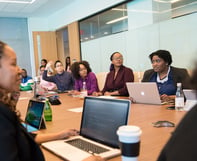Published on
Industry and Academia Come Together with Apprenticeships
Popular across Europe, apprenticeships are beginning to become more popular in North America and have the potential to close the ever-widening skills gap that leaves college graduates and hiring corporations on different sides of a chasm.
“As we’re growing and expanding, we’re adding more and more automation and robotics,” Ryan Childers, who oversees BMW’s apprenticeship program, which comprises 55 students, told The Chronicle of Higher Education’s Aisha Labi. “Here in South Carolina, we can’t readily find those multiskilled employees out there who have all the mechanical, electrical, robotics, and other skills we need.”
While there is no obligation on the part of the corporation to hire their apprentices after they complete the program, and no obligation on the part of the student to accept any potential offers of employment, such a relationship is certainly of value both to employers and graduates.
“These students are receiving experience in our plants, working all the way through their degree, and earning valuable technical training,” said Childers. “Apprenticeships are making a comeback in the U.S.”
Apprenticeship programs are certainly growing in popularity and are becoming more common in the training of middle- and high-skill jobs in health care, information technology, manufacturing, the service industry and elsewhere. South Carolina—where BMW’s apprenticeship program is based—is moving to widen the spread of apprenticeship programs in their state. Officials have developed a program in cooperation with the state’s technical college system to foster the creation of apprenticeship and offering tax incentives and free consulting services to employers in exchange for being recognized as part of the national Registered Apprenticeship system.
“We’re not trying to sell the German dual-system approach,” Robert Schwartz, a Harvard professor and co-author of “Pathways to Prosperity”, told Labi. “What we are trying to do is basically say that the goal here is to build a set of pathways… through one- or two-year programs, based on the same principles that underlie the German system, through programs that align skills and work.”


